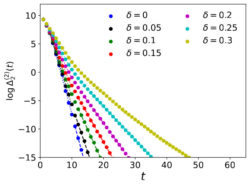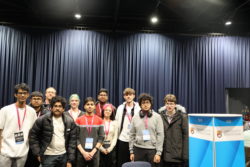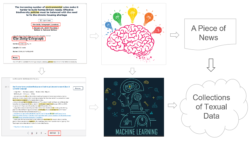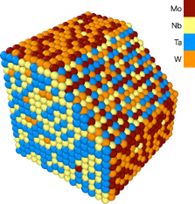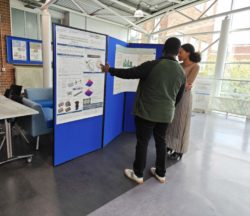In this case study, we hear from Jonathon Riddell (School of Physics), who has been utilising BlueBEAR to study strongly correlated quantum systems out of equilibrium. My name is Jonathon Riddell, I am a fellow of non-equilibrium physics, in the Theoretical Physics Group. I am working on several projects, all of them with heavy reliance … Continue reading “10,12,14 to infinity: quantum research is classically hard”
Tag: HPC
Baskerville multi-GPU RSE call
Many new and upcoming HPC systems provide computing power through GPUs. Relatively little research software uses such hardware and less still can fully exploit multiple GPUs simultaneously. The Research Software Group (RSG) is in a position to offer time-limited support to researchers at the University of Birmingham with research software that currently runs on GPUs … Continue reading “Baskerville multi-GPU RSE call”
BEAR Challenge student teams compete in national Cluster Challenge
Two of the top-performing student teams from BEAR Challenge 2024 have gone onto compete in a national student cluster challenge. Online challenges began in October and culminated in three days of in-person activities in Manchester, where they competed with 14 other teams from universities across the UK at Computing Insight UK (CIUK). From the start … Continue reading “BEAR Challenge student teams compete in national Cluster Challenge”
Molecular Photophysics: a connection between Theoretical Chemistry and Ultrafast Spectroscopy
In this case study, we hear from Reza Omidyan (School of Chemistry), who has been utilising BEAR to predict the photophysical properties of biological and chemical compounds. I am an associate professor of Physical Chemistry, and since a few months ago, I have been utilizing BlueBEAR, the supercomputer at the University of Birmingham for my … Continue reading “Molecular Photophysics: a connection between Theoretical Chemistry and Ultrafast Spectroscopy”
Unlocking the power of BlueBEAR for social science research
In this case study, we hear from Shuyu Li (based in the Department of Economics), who has been utilising BEAR for tackling complex environmental economics problems. As a PhD student in Environmental Economics at the University of Birmingham, I’ve always been fascinated by the ways in which cutting-edge technology can unlock new avenues for research. My work … Continue reading “Unlocking the power of BlueBEAR for social science research”
Training accurate Machine Learnt Interatomic Potentials (MLIPs) for High Entropy Alloys (HEAs)
In this case study, we hear from Joseph Arnold (based at the School of Metallurgy and Materials), who has been utilising BEAR for developing machine learning-based interatomic potential’s (MLIP). I am a postdoctoral research fellow in the Gurrutxaga-Lerma research group within the School of Metallurgy and Materials, here at the University of Birmingham. My research … Continue reading “Training accurate Machine Learnt Interatomic Potentials (MLIPs) for High Entropy Alloys (HEAs)”
BEAR PGR/ECR Conference opportunity 2025
We are starting to plan for the 14th BEAR conference – an event originally created to give PhD students experience in running a conference, as well as provide a showcase for the fantastic research done on services provided by Birmingham Environment for Academic Research (BEAR). With previous support from the Graduate School and our suppliers, … Continue reading “BEAR PGR/ECR Conference opportunity 2025”
Studying battery materials using high performance cluster BlueBEAR
In this case study, we hear from Sandeep Das (based at the School of Chemistry), who has been utilising BEAR to design novel Li-ion battery materials. I am a postdoctoral researcher and computational chemist in the Scanlon Materials Theory Group based at the School of Chemistry, University of Birmingham. My research is currently focussed on … Continue reading “Studying battery materials using high performance cluster BlueBEAR”
A computational fluid dynamic model of an ultra clean air operating theatre
In this case study, we hear from Andrew Thomas (Birmingham Medical School), a Consultant Orthopaedic Surgeon at the Royal Orthopaedic Hospital NHS Foundation Trust, who has been utilising BlueBEAR to produce a new Computational Fluid Dynamics (CFD) model of the type of operating theatre used for joint replacement surgery. The research by the team was … Continue reading “A computational fluid dynamic model of an ultra clean air operating theatre”
Investigating the brain with BEAR
In this case study, we hear from Brandon Ingram (based at the School of Psychology), who has been utilising BEAR to deepen their understanding of the mechanisms our brains employ to interpret visual stimuli. My research focuses on integrating electroencephalography (EEG) and functional magnetic resonance imaging (fMRI) to gain a more comprehensive understanding of how … Continue reading “Investigating the brain with BEAR”

